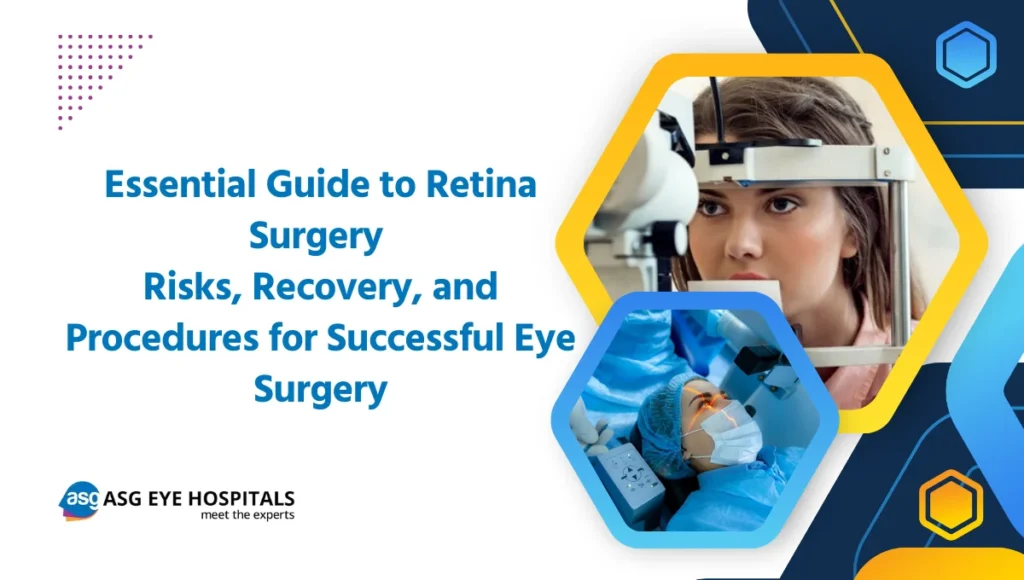Retina eye surgery is that part of ophthalmic surgery focused particularly on the management of disorders or diseases normally affecting the retina, responsible for light capture in the eye and transmitting their responsive signals to the brain. This detailed guide breaks down the complex information about retina surgery, such as the procedures involved, potential risks, factors to consider before retinal surgery, and the recovery processes, so that patients can understand how the treatment leads to successful outcomes.
What is Retina?
It is a thin layer of tissue lining the back of the eye, which converts light into neural signals that are transmitted to the brain by the optic nerve, enabling us to see. A variety of disorders may badly deteriorate a person’s vision, some of which require surgical treatment to prevent further damage to the retina.
Common Conditions Requiring Retina Surgery
- Retinal Detachment: A condition in which the retina pulls away from its normal position and results in permanent blindness, if not treated promptly.
- Macular Holes: These are small breaks or tears in the macula (the central part of the retina), responsible for sharp central vision.
- Diabetic Retinopathy: It is a complication of diabetes that affects the blood vessels in the retina and can cause loss of vision.
- Epiretinal Membranes: Thin layers of fibrous tissue grow on the surface of the retina, wrinkling its surface and causing distorted vision
- Vitreous Hemorrhage: Bleeding into the vitreous, the gel-like substance that fills the center of the eye, blood may block the passage of light to the retina.
Retinal Surgery Procedure
Retina surgery involves several specialized procedures, each designed to address specific conditions:
- Vitrectomy: This is the most usual type of procedure where the vitreous gel of the eye is generally removed. With this, surgeons gain one way with a clear path to the retina; in other words, the retina is exposed to treat several problems like retinal detachment, vitreous hemorrhage, or macular hole.
- Retinal Detachment surgery: These techniques vary depending on the severity and location of the detachment but often involve securing the retina back into place using gas bubbles or silicone oil to keep it in position.
- Macular Hole Surgery: A surgical incision into the eye to remove the vitreous gel and apply a gas bubble that closes the hole and allows the retina to heal independently.
- Epiretinal Membrane Surgery: In this technique, retina surgeons gently peeled off Scar tissue from the retina’s surface, restoring clearer vision.
Factors to consider before retina surgery
A decision about surgery on the retina is not to be made lightly. The following eight factors are to be kept in mind while opting for retina surgery:
1. Diagnosis and severity: Be aware of your specific diagnosis and the severity of your problem as it regards the retina. Different conditions—retinal detachment, diabetic retinopathy, and macular hole— may require different surgical approaches and have varying levels of risk.
2. Consult Specialists: Meet a retinal specialist or only an ophthalmologist who deals with retina surgery. They will be able to give you an insight into your condition, discuss treatment options with you, and help you understand the possible outcomes and the risks of surgery.
3. Risks and Benefits: Be aware of the risks and benefits that surgery might pose. The major risks to be concerned about are infection, bleeding, cataract formation, increased eye pressure, or additional surgeries that one may need. On the other hand, improvement in vision or at least maintaining the current state of vision by causing less loss is very beneficial.
4. Alternative Treatments: Be aware of other treatments or therapies that may be provided for your condition. Sometimes, especially in cases that are not serious, intervention can include non-surgical options like medication or laser therapy.
5. Recovery: Several surgeries take months and years before one is finally fit. Get information about post-operative care, the limitations, and follow-up appointments.
6. Long-term Prognosis: Discuss the prognosis long-term, both without and with surgery. Understand what realistic expectations you can have of being improved after surgery and what the possibility of recurrence or possible complications may be.
7. Financial Considerations: Assess the financial burden of surgery by considering all procedure costs, follow-up appointments, medicines, and possible complications that might be treated in the future.
8. Second Opinion: There is no harm in getting a second opinion from another retinal specialist or a similar consultation to get a fair idea of your condition and its treatment prospects. This may also help in further reassurance or other options on the recommended treatment plan.
Risks Associated with Retina Surgery
Though retina surgery is generally safe and effective, it is not devoid of risks. Inherent retina surgery risks include:
- Infection: Though this is a rare case, as in every other surgery, an infection might occur, which can cause blindness if not treated promptly.
- Cataract Formation: The removal of vitreous gel during surgery can accelerate the development of cataracts.
- Increased Eye Pressure: It might develop after surgery and it requires further treatment.
- Retinal Tears: This can happen during the consumption process of the vitrectomy. It is one of the complications.
Retina Surgery Recovery Process
Recovery from retina surgery varies depending on the procedure performed and the patient’s overall health. However, common aspects of the recovery process include:
Some common aspects of the recovery process are as follows:
- Post-operative care: Patients are generally asked to maintain the head in a certain position so that the gas bubble or silicone oil placed in the eye during surgery stays in place.
- Medications: Eye drops or oral medications will be prescribed to prevent infection and control inflammation.
- Follow-Up Visits: Regular visits to an eye specialist are necessary to check up on healing and take up any issues that may present themselves.
Conclusion:
Retinal surgery plays a crucial role in vision preservation and restoration in many persons suffering from various retinal diseases. Once patients understand the procedures, risks, and recovery involved with surgery, they can approach it confidently, knowing they are doing everything possible for their visual health. Consult an experienced eye retina specialist and decide on the appropriate treatment plan that will suit all individual needs towards achieving the best outcomes. Success in retina surgery depends on several factors, among which are early diagnosis, skill on the part of the surgeon, and adherence to postoperative care instructions on the part of the patient. Patients need to immediately report to the treating doctor if any variations in vision or other symptoms are noticed.



